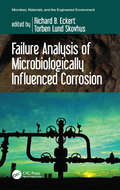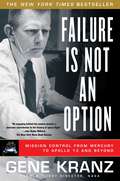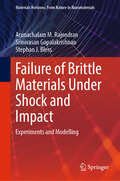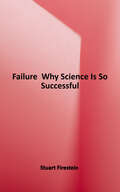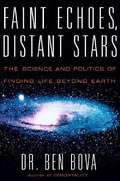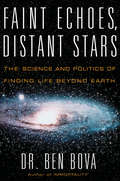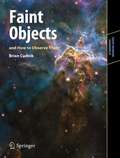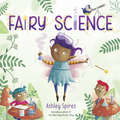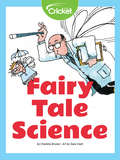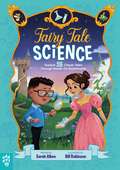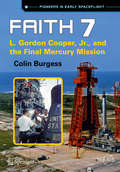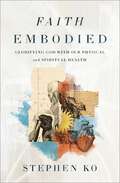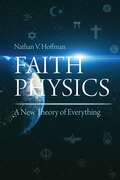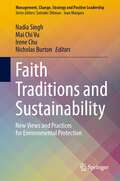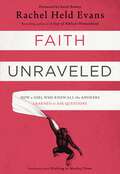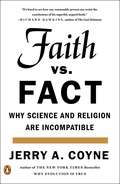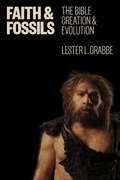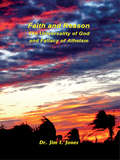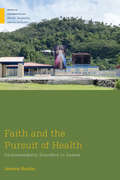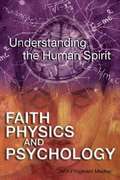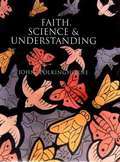- Table View
- List View
Failure Analysis of Microbiologically Influenced Corrosion (Microbes, Materials, and the Engineered Environment)
by Richard B. EckertFailure Analysis of Microbiologically Influenced Corrosion serves as a complete guide to corrosion failure analysis with an emphasis on the diagnosis of microbiologically influenced corrosion (MIC). By applying the principles of chemistry, microbiology, and metallurgy, readers will be able to reliably determine the mechanistic cause of corrosion damage and failures and select the appropriate methods for mitigating future corrosion incidents. FEATURES Provides background information on the forensic process, types of data or evidence needed to perform the analysis, industrial case studies, details on the MIC failure analysis process, and protocols for field and lab use Presents up-to-date advances in molecular technologies and their application to corrosion failure investigations Offers specific guidelines for conducting MIC failure analyses and case studies to illustrate their application Examines state-of-the-art information on MIC analytical tools and methods With authors with expertise in microbiology, corrosion, materials, and failure investigation, this book provides tools for engineers, scientists, and technologists to successfully combat MIC issues.
Failure Is Not an Option
by Gene KranzThis memoir of a veteran NASA flight director tells riveting stories from the early days of the Mercury program through Apollo 11 (the moon landing) and Apollo 13, for both of which Kranz was flight director.Gene Kranz was present at the creation of America's manned space program and was a key player in it for three decades. As a flight director in NASA's Mission Control, Kranz witnessed firsthand the making of history. He participated in the space program from the early days of the Mercury program to the last Apollo mission, and beyond. He endured the disastrous first years when rockets blew up and the United States seemed to fall further behind the Soviet Union in the space race. He helped to launch Alan Shepard and John Glenn, then assumed the flight director's role in the Gemini program, which he guided to fruition. With his teammates, he accepted the challenge to carry out President John F. Kennedy's commitment to land a man on the Moon before the end of the 1960s. Kranz recounts these thrilling historic events and offers new information about the famous flights. What appeared as nearly flawless missions to the Moon were, in fact, a series of hair-raising near misses. When the space technology failed, as it sometimes did, the controllers' only recourse was to rely on their skills and those of their teammates. He reveals behind-the-scenes details to demonstrate the leadership, discipline, trust, and teamwork that made the space program a success. A fascinating firsthand account by a veteran mission controller of one of America's greatest achievements, Failure is Not an Option reflects on what has happened to the space program and offers his own bold suggestions about what we ought to be doing in space now. space now. This is a fascinating firsthand account written by a veteran mission controller of one of America's greatest achievements.
Failure of Brittle Materials Under Shock and Impact: Experiments and Modelling (Materials Horizons: From Nature to Nanomaterials)
by Srinivasan Gopalakrishnan Stephan J. Bless Arunachalam M. RajendranThe book focuses primarily on experimental and analytical methods developed over many years to characterize the deformation and fracture of brittle materials under dynamic loading conditions. The dynamic response of brittle materials is highly nonlinear and complex, with practical applications ranging from explosive excavation of rocks to the design of ceramic armor and the protection of spacecraft windows from meteor impacts. It provides a comprehensive exploration of the challenges and methodologies involved in impact experiments and computational modeling of brittle solids under shock and impact loading, making it essential reading for those seeking realistic solutions to blast and ballistic problems. For example, the book emphasizes the significance of validating numerical code solutions through simulations. This involves understanding and evaluating the impact of various factors such as appropriate boundary conditions, high-resolution finite element meshes, solution time steps, contact algorithms, interface modeling, artificial viscosity, erosion of elements, particle conversion, and model parameters on the accuracy of solutions. It selectively presents examples of modeling and simulations of ballistic problems drawn from the open literature. While numerous articles on the book's topic exist in the literature, this volume integrates key aspects of high strain rate impact experiments, modeling, and simulations of brittle failure in ceramics, rocks, oil shale, and cementitious materials across various stress and strain states. To the best of the authors' knowledge, no other compilation covers such a wide array of experimental techniques used in this field, particularly for ceramics, yet adaptable for other heterogeneous brittle solids. Despite the extensive literature on this subject, most impact experimental configurations have been limited to specific geometries and have not encompassed the broad range of techniques necessary to characterize and validate constitutive behaviors used in modern numerical codes. Many researchers and engineers are often unaware of the specialized experiments and models presented in international conference proceedings or technical presentations. This book addresses that gap by encompassing a broader range of unique impact experiments, constitutive and damage modeling, and computational simulations not found in any existing publication.
Failure: Why Science is so Successful
by Stuart FiresteinThe general public has a glorified view of the pursuit of scientific research. However, the idealized perception of science as a rule-based, methodical system for accumulating facts could not be further from the truth. Modern science involves the idiosyncratic, often bumbling search for understanding in uncharted territories, full of wrong turns, false findings, and the occasional remarkable success. In his sequel to Ignorance (Oxford University Press, 2012), Stuart Firestein shows us that the scientific enterprise is riddled with mistakes and errors - and that this is a good thing! Failure: Why Science Is So Successful delves into the origins of scientific research as a process that relies upon trial and error, one which inevitably results in a hefty dose of failure. <p><p>Scientists throughout history have relied on failure to guide their research, viewing mistakes as a necessary part of the process. Citing both historical and contemporary examples, Firestein strips away the distorted view of science as infallible to provide the public with a rare, inside glimpse of the messy realities of the scientific process. An insider's view of how science is carried out, this book will delight anyone with an interest in science, from aspiring scientists to curious general readers. Accessible and entertaining, Failure illuminates the greatest and most productive adventure of human history, with all the missteps along the way.
Faint Echoes, Distant Stars: The Science and Politics of Finding Life Beyond Earth
by Ben BovaDr. Ben Bova explores some of the key players and the arguments waged in a debate of both scientific and cultural priorities, showing the emotions, the controversy, and the egos involved in arguably the most important scientific pursuit ever begun.
Faint Echoes, Distant Stars: The Science and Politics of Finding Life Beyond Earth
by Ben BovaOur neighboring planets may have the answer to this question. Scientists have already identified ice caps on Mars and what appear to be enormous oceans underneath the ice of Jupiter's moons. The atmosphere on Venus appeared harsh and insupportable of life, composed of a toxic atmosphere and oceans of acid -- until scientists concluded that Earth's atmosphere was eerily similar billions of years ago. An extraterrestrial colony, in some form, may already exist, just awaiting discovery. But the greatest impediment to such an important scientific discovery may not be technological, but political. No scientific endeavor can be launched without a budget, and matters of money are within the arena of politicians. Dr. Ben Bova explores some of the key players and the arguments waged in a debate of both scientific and cultural priorities, showing the emotions, the controversy, and the egos involved in arguably the most important scientific pursuit ever begun.
Faint Objects and How to Observe Them
by Brian CudnikFaint Objects and How to Observe Them is for visual observers who are equipped with a 10-inch or larger astronomical telescope and who want to "go deep" with their observing. It provides a guide to some of the most distant, dim, and rarely observed objects in the sky, supported by background information on surveys and objects lists - some familiar, such as Caldwell, and some not so familiar. This book not only provides a wealth of experience compiled from several sources, but it also gives an historical background to surveys whose names may or may not be familiar to most amateur astronomers. Finally, it includes a listing of the many galaxy clusters out there, from "nearby" ones such as Stefan's Quintet to some of the most distant groups observable through the largest telescopes.
Fairy Science (Fairy Science)
by Ashley SpiresAn enchanting STEM-and-fairy-filled picture book from the award-winning author-illustrator of The Most Magnificent Thing!All the fairies in Pixieville believe in magic--except Esther. She believes in science.When a forest tree stops growing, all the fairies are stumped--including Esther. But not for long! Esther knows that science can get to the root of the problem--and its solution! Whether you believe in fairy magic or the power of science, you will be charmed by Esther, the budding fairy scientist.
Fairy Science (Fairy Science)
by Ashley SpiresThe award-winning author of The Most Magnificent Thing introduces the value of science and inquiry to young readers with humor and heart. For fans of Ada Twist, Scientist and Hidden Figures.Esther the fairy doesn't believe in magic. But fairies are all about magic, despite Esther's best efforts to reveal the science of their world. No matter how she and her bird, Albert, explain that rainbows are refracted light rather than a path to gold, or that mist is water evaporating rather than an evil omen, or the importance of the scientific method, her fairymates would rather just do magic. So when the other fairies' solution to helping a dying tree is to do a mystical moonlight dance, Esther decides to take it upon herself to resuscitate the tree . . . with the scientific method, some hypothesizing, a few experiments and the heady conclusion that trees need sunlight to live! But while Esther manages to save the tree, she can't quite change the minds of her misguided fairymates . . . or can she?Fairy Science, the first in a hilarious new picture book series, introduces a charming, determined heroine as she learns about the world and celebrates the joys of curiosity and exploring science.
Fairy Tale Science
by Charlene BrussoIs magic real? Fairy tales are stories that teach us moral issues, often with the use of magic. But what would happen to those stories if they were set in the real world? See how science and technology can create the "magic" you see in your favorite fairy tales.
Fairy Tale Science
by Sarah AlbeeExplore the laws of physics, principles of chemistry, and wonders of biology in this collection of classic stories with a hands-on STEM twist.From Snow White to Chicken Little to Ali Baba and the Forty Thieves—read each story like a scientist!• Determine if a glass slipper can withstand an evening of ballroom dancing.• Explore the buoyancy of a magical frog.• Test the power of blowing air on a house.And so much more!Find out what happens actually ever after!"A lively and captivating book." - Kirkus
Faith 7
by Colin BurgessThis book celebrates the final spaceflight in the Mercury series, flown by NASA astronaut Gordon Cooper, who led an adventurous life in the cockpit of airplanes and spacecraft alike, and on his Mercury mission he became the last American ever to rocket into space alone. He flew in the Mercury and Gemini programs and served as head of flight crew operations in both the Apollo and Skylab programs. Based on extensive research and first-person interviews, this is a complete history of the Faith 7 flight and its astronaut. Cooper later gained notoriety following the release of the movie, The Right Stuff, in which he was depicted by Dennis Quaid, but Burgess discovers there was even more drama to his story. It completes the "Pioneers in Early Spaceflight" subseries in fitting fashion.
Faith Embodied: Glorifying God with Our Physical and Spiritual Health
by Stephen KoScientist, physician, and pastor Stephen Ko explains how to live and worship incarnationally and glorify God with our bodies.Many of us don't see much connection between spiritual and physical health. We say grace before digging into greasy, fatty meals we know are bad for us. We read Scripture on our phones before switching to social media feeds that hijack the neural circuitry in our brains. Or we take our physical health too seriously, distancing ourselves from the sick and the needy whom Jesus embraced.On his journey from pediatrician to public health officer for the CDC to senior pastor of the largest New York Chinese Alliance Church, Stephen Ko has seen that these divisions between physical and spiritual health are artificial. In Faith Embodied, he reminds us that our "bodies are temples of the Holy Spirit" (1 Corinthians 6:19). Christ incarnate is deity in flesh, and His spirit is incarnate in us. Living and worshiping incarnationally is consciously embracing what the Creator has designed in His image, from the finest, microscopic details to vital organs within our body, enabling the Holy Spirit to work in us.Faith Embodied will teach you to:Understand subconscious ways that thwart the design of the Creator.Embrace choices that invite incarnational health, living, and worship.Experience God in every aspect of your life, from flesh and bone to heart and soul.View the five senses (sight, smell, hearing, touch, taste) in a different lightReflect the image of God in the way you breathe, move, create, love, and rest.Weaving together insights from faith, science, and medicine, Ko reveals the marvelous ways in which our physical and spiritual health can prepare us to become instruments of God's healing in the world.A companion streaming video study is also available.
Faith Physics: A New Theory of Everything
by Nathan V HoffmanFaith Physics is a new Theory of Everything (ToE) combining ancient spiritual wisdom and modern quantum physics findings to deliver a belief system that is both intellectually sound and spiritually satisfying. It maintains an ineffable Supreme Con
Faith Traditions and Sustainability: New Views and Practices for Environmental Protection (Management, Change, Strategy and Positive Leadership)
by Nicholas Burton Mai Chi Vu Nadia Singh Irene ChuMajor religious traditions have begun to reflect on sustainability concerns in their theology and practice. Little research, however, has explored the implications of this development for organizational behavior as well as secular thinkers and practitioners of sustainable development. This book elucidates the varied ways in which faith traditions provide new forms of coping mechanisms to deal with environmental challenges confronting humanity through an integrative review and critical analysis of recent research. Bringing together a compendium of religious and faith traditions, rooted in both Eastern and Western approaches, the work provides a new perspective and presents alternative paradigms to deal with the contemporary ecological crises. The UN Interfaith Statement on Climate Change (2021) highlights the importance of faith traditions to foster “shared moral responsibility for the environment” and set an example for the “life-style of billions of people and political leaders around the world to act more boldly in protecting people and planet.” This interdisciplinary work examines the interaction between management/organizational settings and spirituality focusing on a range of contexts and spiritual traditions including Buddhism, Sikhism, Christianity, Confucianism, mindfulness practices and indigenous spiritual traditions. Featuring theoretical papers and case studies from different contexts and geographical regions, this book provides researchers, faculty, students, and practitioners with a broad overview of the field from a research perspective, while keeping an eye on building a bridge between scholarship and practice.
Faith Unraveled: How a Girl Who Knew All the Answers Learned to Ask Questions
by Rachel Held EvansHow an evolving spiritual journey leads to an unshakeable faith Eighty years after the Scopes Monkey Trial made a spectacle of Christian fundamentalism and brought national attention to her hometown, Rachel Held Evans faced a trial of her own when she began to have doubts about her faith. In Faith Unraveled, Rachel recounts growing up in a culture obsessed with apologetics, struggling as her own faith unraveled one unexpected question at a time. In order for her faith to survive, Rachel realizes, it must adapt to change and evolve. Using as an illustration her own spiritual journey from certainty to doubt to faith, Evans challenges you to disentangle your faith from false fundamentals and to trust in a God who is big enough to handle your tough questions. In a changing cultural environment where new ideas seem to threaten the safety and security of the faith, Faith Unraveled is a fearlessly honest story of survival.
Faith Versus Fact
by Jerry A. CoyneThe New York Times bestselling author explains why any attempt to make religion compatible with science is doomed to fail In his provocative new book, evolutionary biologist Jerry A. Coyne lays out in clear, dispassionate detail why the toolkit of science, based on reason and empirical study, is reliable, while that of religion--including faith, dogma, and revelation--leads to incorrect, untestable, or conflicting conclusions. Coyne is responding to a national climate in which over half of Americans don't believe in evolution (and congressmen deny global warming), and warns that religious prejudices and strictures in politics, education, medicine, and social policy are on the rise. Extending the bestselling works of Richard Dawkins, Daniel Dennett, and Christopher Hitchens, he demolishes the claims of religion to provide verifiable "truth" by subjecting those claims to the same tests we use to establish truth in science. Coyne irrefutably demonstrates the grave harm--to individuals and to our planet--in mistaking faith for fact in making the most important decisions about the world we live in.
Faith Versus Fact: Why Science and Religion Are Incompatible
by Jerry A. CoyneThe New York Times bestselling author explains why any attempt to make religion compatible with science is doomed to fail In his provocative new book, evolutionary biologist Jerry A. Coyne lays out in clear, dispassionate detail why the toolkit of science, based on reason and empirical study, is reliable, while that of religion--including faith, dogma, and revelation--leads to incorrect, untestable, or conflicting conclusions. Coyne is responding to a national climate in which over half of Americans don't believe in evolution (and congressmen deny global warming), and warns that religious prejudices and strictures in politics, education, medicine, and social policy are on the rise. Extending the bestselling works of Richard Dawkins, Daniel Dennett, and Christopher Hitchens, he demolishes the claims of religion to provide verifiable "truth" by subjecting those claims to the same tests we use to establish truth in science. Coyne irrefutably demonstrates the grave harm--to individuals and to our planet--in mistaking faith for fact in making the most important decisions about the world we live in.
Faith and Fossils: The Bible, Creation, and Evolution
by Lester L. GrabbeMany books have been written on the Bible and evolution by scientists, but this volume is written by a biblical specialist. In Faith and Fossils Lester Grabbe, a prominent Hebrew Bible scholar, examines the Bible in its ancient context and explores its meaning in light of emerging scientific evidence. Both the Bible and the fossil record raise significant questions about what it means to be human, and Grabbe expertly draws on both sources to grapple with who we are and where we came from. Written in uncomplicated language and featuring eleven spectacular color plates, Grabbe&’s Faith and Fossilscreatively shows how science and faith intersect in questions about human origins.
Faith and Fossils: The Bible, Creation, and Evolution
by Lester L. GrabbeMany books have been written on the Bible and evolution by scientists, but this volume is written by a biblical specialist. In Faith and Fossils Lester Grabbe, a prominent Hebrew Bible scholar, examines the Bible in its ancient context and explores its meaning in light of emerging scientific evidence. Both the Bible and the fossil record raise significant questions about what it means to be human, and Grabbe expertly draws on both sources to grapple with who we are and where we came from. Written in uncomplicated language and featuring eleven spectacular color plates, Grabbe’s Faith and Fossilscreatively shows how science and faith intersect in questions about human origins.
Faith and Reason: The Universality Of God And Fallacy Of Atheism
by Jim I. JonesFaith and Reason may be of interest to people who wish to see a path to God based on reason. A concept of God is foundational for the sciences, philosophy, anthropology, psychology, and sociology as well as theology and major religions. The concept of no god and atheism is fallacious; it is nonsense to deny the universality of God, which plays a significant role in the lives of more than three-quarters of the world’s people. The book includes ideas from distinguished theologians, philosophers and scientists. The need for consideration of a theological framework for religion is presented. Its purpose is twofold. First, it acts as a roadmap for understanding societal and personal improvement and advancement initiatives that use a holistic view of the history of relevant philosophical perspectives to present how belief and commitment to community can guide improving the human condition. Second, it presents detailed modeling constructs, and references to specific thinkers and philosophers to demonstrate the need for a spiritual relationship with God and each other.
Faith and the Pursuit of Health: Cardiometabolic Disorders in Samoa (Medical Anthropology)
by Jessica HardinFaith and the Pursuit of Health explores how Pentecostal Christians manage chronic illness in ways that sheds light on health disparities and social suffering in Samoa, a place where rates of obesity and related cardiometabolic disorders have reached population-wide levels. Pentecostals grapple with how to maintain the health of their congregants in an environment that fosters cardiometabolic disorders. They find ways to manage these forms of sickness and inequality through their churches and the friendships developed within these institutions. Examining how Pentecostal Christianity provides many Samoans with tools to manage day-to-day issues around health and sickness, Jessica Hardin argues for understanding the synergies between how Christianity and biomedicine practice chronicity.
Faith, Physics and Psychology: Rethinking Society and the Human Spirit
by John Fitzgerald MedinaOn religion, spirituality, and new society. Despite the progress of Western Civilization in economic, scientific, and other areas, a lack of corresponding progress with respect to spiritual life has left much of society feeling disoriented and unbalanced. Medina's insight sheds light on ways to address this imbalance. The ultimate goal of this examination is to present a path toward a prosperous global civilization that fulfills humanity's physical, psychological, and spiritual needs.
Faith, Science and Understanding
by John C. PolkinghorneOne of the most highly regarded scientist-theologians of our time explores aspects of the interaction between science and theology, focusing in particular on reconciling the scientific and religious theories about creation of the universe. Three centuries of debate are examined, including the works of important contemporary contributors.
Faith, Science and Understanding
by John PolkinghorneIn this captivating book, one of the most highly regarded scientist-theologians of our time offers a thought-provoking exploration of the interaction between science and theology. John Polkinghorne defends the place of theology in the university, discusses the role of revelation in religion, and focuses closely on reconciling what science can say about the processes of the universe with theology's belief in a God active within creation.
